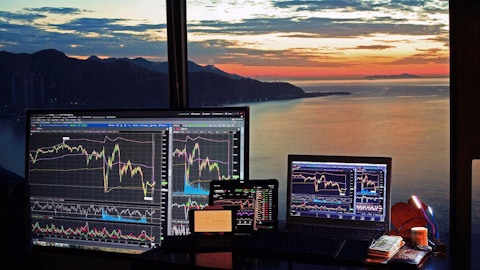Martin Englert: Thank you for the additional color there. One quick question on the insurance recovery. I know that was a significant impact a quarter ago. There was a $4 million positive impact that was related to a prior event at Everett. Can you remind me of what the timing was of that event at Everett that it was associated with? And then I’m curious, why isn’t this excluded from the adjusted EBITDA for the quarter in the one year report, the results there?
Stefano Gaggini: Yes, I’ll take that. So the recoveries in the current quarter are in connection with the fire that we experience at our Everett, Massachusetts, shredder facility in December of 2021, so two years ago. And since then, we have been in negotiation with our insurance partners regarding the property damage and business interruption impact and claim that we have made under the insurance. And so in the current quarter, we recognize, as you said, $4 million incrementally associated with that claim. And we are at this point in advanced stages of negotiations. And we would expect to, at some point, settle this in short order. From an approach from a non-GAAP perspective, I will remind you that when we experience the financial impact of the operational disruptions associated with this event, which happened in the last couple of years.
We did not exclude that impact from our adjusted EBITDA. And consistent with that approach, we do not adjust out insurance recoveries when they are recognized in our income statement as in the current quarter.
Martin Englert: Okay. Do you — so there was $41 million last quarter, $4 million this quarter, were up $45 million, and apologies. Is there anything else before that? And I guess more importantly, is there anything else? What else are you expecting from this? And maybe timing around it?
Stefano Gaggini: Yes, Martin. So you might remember we have had two significant insurance claims. One was related to this average shredder event. There was another one related to the mill. That one was settled in Q4. It was part of that higher amount of recoveries, because of all the settlement of that claim. So there is nothing related to that, that is open. At this point, while we cannot project the potential remaining amount or the timing right for our settlement or progress in our negotiations with insurance partners, we do not expect the magnitude to be as significant as what we recognize to date around these claims and I’ll leave it at that.
Martin Englert: All right. Thank you very much. Good luck.
Stefano Gaggini: Thank you.
Operator: Thank you. One moment for questions. Our next question comes from Samuel McKinney with KeyBank Capital Markets. You may proceed.
Phil Gibbs: Hey, it’s Phil Gibbs actually. Good morning.
Tamara Lundgren: Good morning, Phil.
Stefano Gaggini: Good morning.
Phil Gibbs: Question is just on the global seaborne freight market. There looks to be a lot of volatility and some things we’re reading sort of in the European region specifically about some maybe some port constraints. What are you seeing in terms of the freight dynamics and is that something that also kind of clouds your ability to be more specific on guidance?
Stefano Gaggini: Hi, Phil this is Stefano. So kind of looking back, as we think about the impact of freight challenges. And I would put both the Panama Canal, right? And the Red Sea Suez Canal challenges due to the conflict. The impact to our Q1 results, looking back, was not significant. There was not an impact to the availability of bulk ships or containers. So from that perspective, that on top of the fact that freight, right? Freight costs are a pass through from our perspective, there was not a significant impact. What we have heard through market intelligence very recently is that there could be certain surcharges that are being — might be added on certain routes to container freight rates at some point going forward for those containers that go through conflict zones. If that were to happen, there could be an impact at this point, it’s too early to tell, and you’re correct. It remains uncertain from that perspective.
Phil Gibbs: Thank you. And you had mentioned the Twitch to Zorba differential was pretty tight in the quarter, we saw the same thing. Has there been any material change to that dynamic in the last few weeks?
Stefano Gaggini: Yes, I think we mentioned that one of the reasons for that compression in the quarter was how the UAW strike had impacted the demand domestically for Twitch and from an auto production perspective as that UWA strike has now resolved. We have seen a certain pickup in demand coming out of that. I think as we look more long-term, as auto production improves, that’s where we would expect demand for Twitch to increase more significantly and potentially restore that historical premium that we have seen between the higher grade Twitch and Zorba.
Phil Gibbs: Thanks, and then last question. Did you have any planned or unplanned outages going on right now in any of your shredding facilities? And how is Everett performing, kind of, coming out of this recent period? Thank you.
Stefano Gaggini: Thanks Phil. No, we do not have any unplanned outages or the like in any of our shredded facilities.
Operator: Thank you. I would now like to turn the call back over to Tamara Lundgren for any closing remarks.
Tamara Lundgren: Thank you, Josh. Thank you for your time today, everyone. We look forward to speaking with you again in April when we report our second quarter results in the interim. Stay safe and stay well.
Operator: Thank you for your participation. You may now disconnect.
Follow Radius Recycling Inc. (NASDAQ:RDUS)
Follow Radius Recycling Inc. (NASDAQ:RDUS)
Receive real-time insider trading and news alerts




